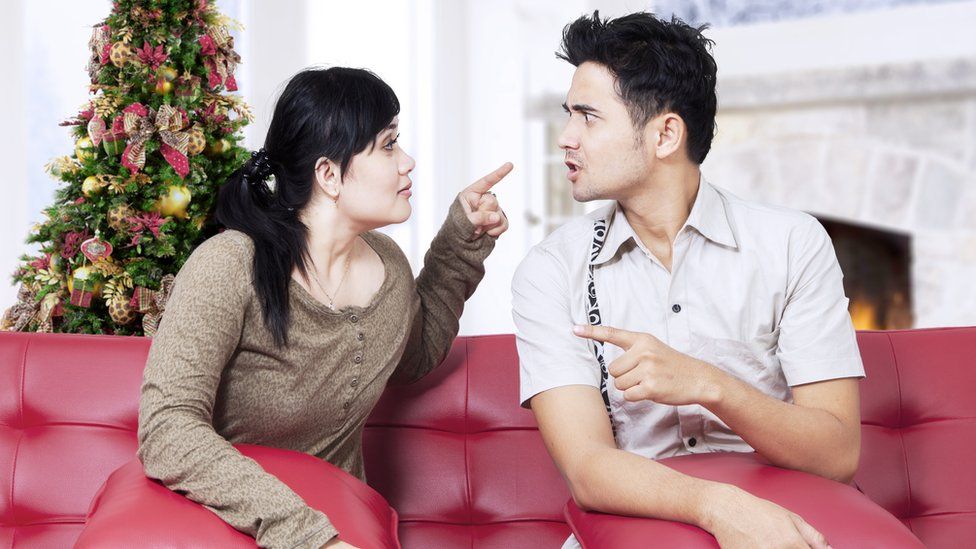BBC explains the best way to handle dimwit conspiracy theorists over Christmas.
Mon 10:16 pm +01:00, 21 Dec 2020How should you talk to friends and relatives who believe conspiracy theories? Remember – medical experts say shouting increases the chance of spreading coronavirus. Yet another reason to keep things low-key.

You’re dreading the moment.
As your uncle passes the roast potatoes, he casually mentions that a coronavirus vaccine will be used to inject microchips into our bodies to track us.
Or maybe it’s that point when a friend, after a couple of pints, starts talking about how Covid-19 “doesn’t exist”. Or when pudding is ruined as a long-lost cousin starts spinning lurid tales about QAnon and elite Satanists eating babies.
The recent rules changes have upended holiday plans for many of us, but you still may find yourself grappling with such situations over the next few days – talking not about legitimate political questions and debates, but outlandish plots and fictions.
So how do you talk to people about conspiracy theories without ruining Christmas?

1: Keep calm
While it’s important to confront falsehoods, it’s never useful if things end up in a flaming row.
“My number one rule would be to not spoil Christmas,” says Mick West, author of Escaping the Rabbit Hole. “An angry, heated conversation will leave everyone feeling rubbish and further cement conspiracy beliefs.”
Psychologist Jovan Byford, a lecturer at the Open University, notes that conspiracy theories often have a strong emotional dimension.
“They are not just about right and wrong,” he says, “but underpinned by feelings of resentment, anger and indignation over how the world works.”
And they’ve boomed this year, with many searching for grand explanations for the pandemic, American politics, and huge world events.
Catherine from the Isle of Wight understands that better than most. The 38-year-old used to be a big believer in conspiracies about vaccines being used to deliberately harm people. She’s since rejected such claims.
“It is extremely important to remain calm at all times,” she says. “Whoever you’re talking to is often just as passionate as you are about your own beliefs and will defend them to the grave.”
And also remember – medical experts say shouting increases the chance of spreading coronavirus. Yet another reason to keep things low-key.
- How I talk to the victims of conspiracy theories
- Coronavirus: How my mum became a conspiracy theory influencer
2: Don’t be dismissive
“Approach conversations with friends and family with empathy rather than ridicule,” says Claire Wardle from First Draft, a not-for-profit which fights misinformation. “Listen to what they have to say with patience.”
Her golden rule is: never publicly shame someone for their views. That’s likely to backfire.

“If you do decide to discuss conspiracy theories, don’t be dismissive of the other person’s beliefs,” Jovan Byford agrees. “Establish some common ground.”
Remember that people often believe conspiracy theories because deep down, they’re worried or anxious. Try to understand those feelings – particularly in a year like the one we’ve just had.
3: Encourage critical thinking
People who believe conspiracy theories often say: “I do my own research.”
The problem is that their research tends to consist of watching fringe YouTube videos, following random people on Facebook, and cherry-picking evidence from biased Twitter accounts.
But the spirit of doubt that pervades the conspiracy-minded internet is actually a key opening for rational thought, says Jovan Byford.
“Many people who believe in conspiracy theories see themselves as healthy sceptics and self-taught researchers into complex issues,” he says. “Present this as something that, in principle, you value and share.
“Your aim is not to make them less curious or sceptical, but to change what they are curious about, or sceptical of.”

That’s what helped Phil from Belfast. He used to be big into 9/11 conspiracies.
“I used to point out the fact that there were various experts who doubted official stories. This was very persuasive to me,” he explains. “Why would these experts lie?”
But then he began applying scepticism not to just “official sources” but also the alternative “experts” that was listening to.
He developed a deeper understanding of the scientific method and scepticism itself. Just because one expert believes something, doesn’t make it true.
“You can find experts and very intelligent people who lend credence to any position,” he says.
“Focus on those who are pushing these ideas, and what they might be getting,” says Claire Wardle. “For instance, financial gain by selling health supplements, or reputational gain in building a following.”
4: Ask questions
Fact-checking is important, but it’s often not the right approach when someone passionately believes in conspiracies. Questions are much more effective than assertions, experts say.
“Focusing on the tactics and techniques used by people pushing disinformation is a more effective way of addressing these conversations than trying to debunk the information,” Claire Wardle says.
Think of general queries that encourage people to think about what they believe. For instance, are some of their beliefs contradictory? Do the details of the theory they’re describing make much sense? Have they thought about the counter-evidence?
“By asking questions and getting people to realise the flaws, you ultimately get people to doubt their own confidence and open them up to hearing alternative views,” says former conspiracy believer Phil.

5: Don’t expect immediate results
You might be hoping that a constructive conversation will end with some kind of epiphany over Christmas pudding – but don’t bet on it.
For those who have fallen deep down the conspiracy rabbit hole, getting out again can be a very long process.
“Be realistic about what you can achieve,” psychologist Jovan Byford warns. “Conspiracy theories instil in believers a sense of superiority. It’s an important generator of self-esteem – which will make them resistant to change.”
For fact-checker Claire Wardle, it’s not just about bruised egos. This year has been scary – and for many, conspiracy theories have been a source of comfort.
“Recognise that everyone has had their lives turned upside down, and is seeking explanations,” she says.
“Conspiracy theories tend to be simple, powerful stories that explain the world. Reality is complex and messy, which is harder for our brains to process.”
But the experts agree that even if you don’t see immediate results – don’t give up.
What did you think of this story? Email Marianna
Subscribe to the BBC Trending podcast or follow us on Twitter @BBCtrending or Facebook .











